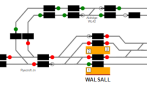Whilst this is demonstrably true for fundamentally identical items, such as Model T Fords or an estate of similar houses, the railway seems to suffer very badly with the fact that a network the length of breadth of GB, with a range from one up to six or more tracks, built to different standards, on earthworks that fall miserably short of modern geotechnical understanding, etc., etc., is the antithesis of 'mass production'. And that's before you consider being often hemmed in by unsympathetic neighbours, numerous heritage structure nearby, complex and lengthy 'planning approval' processes and so on.
Ironically HS2, which some of us might have hoped would provide a steady programme of work for around 15 years, largely removed from the 'old' railway, has demonstrated 'expensive' in Spades.



